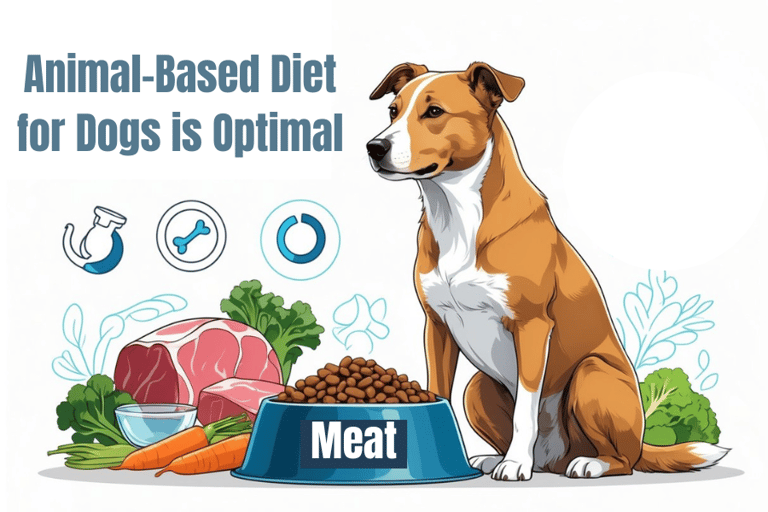Can Dogs Be Vegetarian? Short Answer: Absolutely Not
Why Your Pup Needs Meat for Optimal Health
DOG NUTRITION TIPS
10/1/20256 min read


Can dogs be vegetarian?
Many dog owners wonder if their furry friends can follow the same plant-based lifestyle they do.
While some sources claim dogs can be vegetarian, the reality is far more complex than a simple yes or no answer.
Dogs are biologically designed to thrive on animal proteins, and removing meat from their diet can lead to serious health problems.
The confusion often comes from the fact that dogs can technically digest some plant matter.
However, their digestive systems and nutritional needs remain fundamentally different from humans.
Dogs' bodies are optimized for nutrients found more readily in animal sources, making it extremely difficult to meet their essential requirements through plants alone.
Understanding why dogs need animal proteins and learning about proper nutrition can help pet owners make informed decisions about their dog's diet.
Why Dogs Cannot Thrive On A Vegetarian Diet
Dogs require specific nutrients that are difficult or impossible to obtain from plant sources alone.
Their digestive systems and biological makeup differ greatly from animals that naturally eat plants, creating serious health risks when fed vegetarian diets.
Essential Nutrients Dogs Need
Dogs require several nutrients that come primarily from animal sources.
These nutrients are either missing from plants or exist in forms that dogs cannot use properly.
Vitamin B12 is only found naturally in animal products.
Dogs need this vitamin for proper nerve function and red blood cell formation.
Plant-based diets cannot provide adequate B12 without synthetic supplements.
Complete amino acid profiles are easier to obtain from meat.
While plants contain protein, they often lack one or more essential amino acids that dogs need.
Animal proteins provide all essential amino acids in the right amounts.
Heme iron from meat absorbs much better than iron from plants.
Dogs can develop anemia when they don't get enough usable iron.
Taurine and carnitine support heart health in dogs.
These nutrients are found mainly in animal tissues.
Some dogs develop heart problems when these nutrients are too low.
Biological Differences Between Dogs And Herbivores
Dogs have physical features that show they evolved to eat meat.
Their bodies work very differently from animals that naturally eat only plants.
Teeth structure reveals dogs are meant to eat meat.
Dogs have sharp canine teeth for tearing flesh and carnassial teeth for cutting meat.
Herbivores have flat grinding teeth for breaking down plant material.
Digestive tract length is much shorter in dogs.
Plant-eating animals have very long intestines to break down tough plant fibers.
Dogs have shorter digestive systems that process meat quickly but struggle with complex plant materials.
Stomach acid is much stronger in dogs than in herbivores.
Dogs produce very acidic stomach contents to break down bones and kill bacteria in raw meat.
This strong acid is not needed for plant digestion.
Jaw movement in dogs only goes up and down for crushing.
Herbivores can move their jaws side to side for grinding plant material.
Dogs cannot properly chew tough plant fibers.
Risks Of Plant-Based Diets For Dogs
Dogs can survive on a carefully balanced vegetarian diet but face many health risks.
These diets often lead to serious nutritional problems over time.
Protein deficiency happens when dogs don't get complete amino acids.
Dogs may lose muscle mass, have poor coat quality, and heal slowly from injuries.
Growing puppies are especially at risk for developmental problems.
Mineral imbalances occur because plants contain compounds that block nutrient absorption.
Calcium, zinc, and iron become harder for dogs to absorb from plant sources.
This can cause weak bones and poor immune function.
Digestive problems are common with high-fiber plant diets.
Dogs may experience gas, loose stools, and stomach upset.
Their short digestive systems cannot handle large amounts of plant fiber effectively.
Heart disease can develop from low taurine levels.
Some dogs on plant-based diets develop dilated cardiomyopathy, a serious heart condition.
This problem may not show symptoms until significant damage occurs.
Healthy Alternatives And Responsible Feeding Tips
Dogs need meat-based diets with complete protein sources and essential amino acids that plant foods cannot provide.
Working with veterinary professionals ensures proper nutrition while avoiding the risks of incomplete plant-based feeding.
Balanced Diets For Canine Health
High-quality animal proteins form the foundation of healthy canine nutrition.
Dogs require complete amino acid profiles found in chicken, beef, fish, and lamb.
Raw or cooked meats provide excellent protein sources.
Fish offers omega-3 fatty acids for brain and joint health.
Consulting With A Veterinary Nutritionist
Professional guidance prevents nutritional deficiencies that can cause serious health problems.
Board-certified veterinary nutritionists create customized feeding plans based on individual needs.
Dogs with allergies, kidney disease, or diabetes need specialized diets.
A nutritionist can recommend appropriate therapeutic foods or home-cooked recipes with proper supplementation.
Schedule consultations when changing diets, addressing weight issues, or managing medical conditions.
Many veterinary schools offer nutrition consultations at reduced costs.
Regular blood work monitors nutritional status.
Tests check protein levels, organ function, and vitamin deficiencies before problems develop.
Avoid online diet advice from non-professionals.
Each dog has unique requirements based on age, breed, activity level, and health status that require expert evaluation.
Frequently Asked Questions
Dog owners often worry about digestive problems, protein deficiencies, and shortened lifespans when considering plant-based diets.
Specific nutritional requirements and breed characteristics play important roles in determining whether dogs can thrive without meat.
What are the health implications for dogs on a vegetarian diet?
Dogs face serious nutritional deficiencies on vegetarian diets.
They struggle to get enough complete proteins that contain all essential amino acids.
Vitamin B12 deficiency becomes a major concern.
This vitamin is naturally found in animal products and supports nerve function and red blood cell formation.
Iron absorption poses another challenge.
Dogs absorb iron from meat much better than from plant sources.
Digestive issues often develop.
Many dogs experience stomach upset, gas, and loose stools when switching to plant-based foods.
Muscle mass can decrease over time.
Without adequate animal protein, dogs may lose strength and energy.
Is there difference in lifespan between vegetarian dogs and those on a traditional meat-based diet?
Limited research exists on vegetarian dogs' lifespans.
Most studies focus on short-term health effects rather than long-term survival rates.
Dogs eating balanced meat-based diets typically live longer.
Their bodies evolved to process animal proteins efficiently over thousands of years.
Nutritional deficiencies from vegetarian diets may shorten lifespans.
Missing nutrients can lead to heart problems, weakened immune systems, and organ damage.
What ingredients should be present in vegetarian dog food to meet a dog's nutritional needs?
Dogs require nutrients most available in animal-based foods.
Vitamin B12, heme iron, complete amino acids, taurine, and carnitine are best provided by meats, fish, and eggs.
Supplements may be used, but animal-based foods are the most reliable natural sources.
How can you balance a vegetarian diet for a dog with allergies?
Food allergies complicate vegetarian diets significantly.
Many dogs are allergic to common plant proteins like soy and wheat.
Limited ingredient diets work better for allergic dogs.
Using single animal protein sources like duck or venison is often more effective than plant alternatives.
Hypoallergenic meat-based diets usually work better.
Novel proteins like rabbit or kangaroo cause fewer reactions than complex plant combinations.
Working with a veterinary nutritionist is crucial.
They can help identify safe ingredients and create balanced meal plans.
Are there any breeds of dogs that are more suited to a vegetarian diet?
No specific breeds are naturally suited for vegetarian diets.
All dogs descended from wolves and share similar digestive systems.
Working breeds need more animal protein.
Active dogs like Border Collies and German Shepherds require high-quality proteins for muscle maintenance.
Brachycephalic breeds face additional challenges.
Dogs like Bulldogs and Pugs already have digestive sensitivities that vegetarian diets can worsen.
Individual dogs vary more than breeds.
Some dogs within any breed may tolerate plant foods better than others.
How does the physiological makeup of dogs affect their ability to process a vegetarian diet?
Dogs have shorter digestive tracts than herbivores. Their intestines are designed to quickly process meat rather than break down tough plant fibers.
Their teeth reveal their carnivorous nature. Sharp canines and strong molars are built for tearing and crushing meat and bones.
Stomach acid in dogs is highly acidic. This helps them digest raw meat and bones but isn't optimized for plant matter.
Dogs produce fewer digestive enzymes for plants. They lack sufficient amylase to properly break down plant material.
Their liver processes nutrients differently. Dogs evolved to convert animal proteins into energy more efficiently than plant proteins.






Connect
Reach out for support and inquiries.
Subscribe
contactbowloflove@gmail.com
© 2025. All rights reserved.
